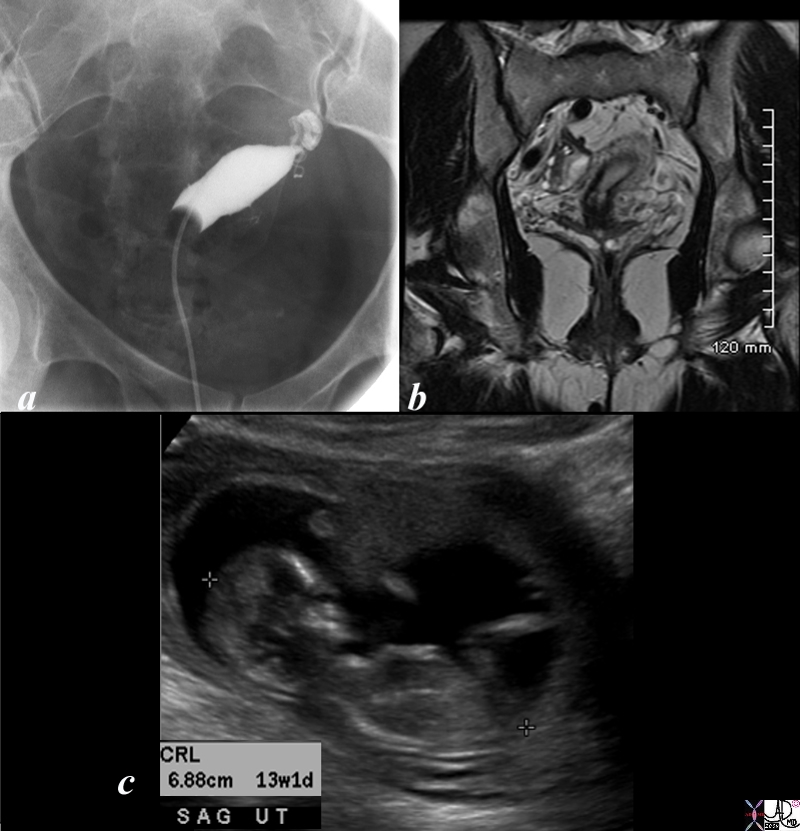The Common Vein
Laura Miller MD
Copyright 2010
Definition
Unicornuate uterus is a congenital anomaly of the uterus caused by incomplete fusion of the mullerian ducts during embryonic development, with partial or complete agenesis of one mullerian duct. This anomaly is often accompanied by agenesis of the kidney and ureter on the same side.
The result is a uterus with a single horn.
The structural change is characterized by a uterine cavity leading to a single uterine horn and fallopian tube. In some cases, there is a remnant of the other uterine horn that does not communicate with the uterine cavity and lower genital tract.
The functional change may be minimal as many women with unicornuate uteri can carry a pregnancy, though with an increased risk of preterm labor and delivery. The functional change is more significant in cases with a remnant of the opposite horn. This rudimentary uterine horn undergoes the normal menstrual cycle but lacks an outlet for blood at menses.
As a result, women present clinically with dysmenorrhea (pain at menses), hematometria (a collection of blood in the obstructed uterine cavity) or pyometria (infection of the obstructed uterine cavity). Pregnancy can also occur in the rudimentary horn, leading to rupture, bleeding and death.
Imaging modalities used to evaluate uterine abnormalities include sonohysterography, hysterosalpingography, and MRI. MRI is useful as it allows for concurrent evaluation of the urinary tract.
Diagnosis is made with these imaging studies, combined with laparoscopy if necessary.
Treatment is resection of the rudimentary uterine horn, if present, and attached fallopian tube to alleviate symptoms and prevent rudimentary horn pregnancy.

Unicornuate Uterus with Subsequent Pregnancy |
|
34 year old female who presented with infertility had a hysterosalpingogram which showed a unicornuate uterus (a). An MRI confirms the diagnosis using a T2 weighted sequence(b). The patient subsequently fell pregnant and was scanned with a normal 13 week pregnancy(c).
Courtesy Ashley Davidoff MD copyright 2010 all rights reserved 85711cL.8s
|
Unicornuate
Unilateral agenesis of Mullerian system results in unicornuate uterus this could give rise to infertility or recurrent abortions.
20% failure of one mullerian duct to elongate
predominance on right
classification
isolated
rudimentary horn
non cavitary (33%)
cavitary 30%
communication with well formed horn 10%
non communicating 23%
DOMElement Object
(
[schemaTypeInfo] =>
[tagName] => table
[firstElementChild] => (object value omitted)
[lastElementChild] => (object value omitted)
[childElementCount] => 1
[previousElementSibling] => (object value omitted)
[nextElementSibling] => (object value omitted)
[nodeName] => table
[nodeValue] =>
Unicornuate Uterus with Subsequent Pregnancy
34 year old female who presented with infertility had a hysterosalpingogram which showed a unicornuate uterus (a). An MRI confirms the diagnosis using a T2 weighted sequence(b). The patient subsequently fell pregnant and was scanned with a normal 13 week pregnancy(c).
Courtesy Ashley Davidoff MD copyright 2010 all rights reserved 85711cL.8s
[nodeType] => 1
[parentNode] => (object value omitted)
[childNodes] => (object value omitted)
[firstChild] => (object value omitted)
[lastChild] => (object value omitted)
[previousSibling] => (object value omitted)
[nextSibling] => (object value omitted)
[attributes] => (object value omitted)
[ownerDocument] => (object value omitted)
[namespaceURI] =>
[prefix] =>
[localName] => table
[baseURI] =>
[textContent] =>
Unicornuate Uterus with Subsequent Pregnancy
34 year old female who presented with infertility had a hysterosalpingogram which showed a unicornuate uterus (a). An MRI confirms the diagnosis using a T2 weighted sequence(b). The patient subsequently fell pregnant and was scanned with a normal 13 week pregnancy(c).
Courtesy Ashley Davidoff MD copyright 2010 all rights reserved 85711cL.8s
)
DOMElement Object
(
[schemaTypeInfo] =>
[tagName] => td
[firstElementChild] => (object value omitted)
[lastElementChild] => (object value omitted)
[childElementCount] => 2
[previousElementSibling] =>
[nextElementSibling] =>
[nodeName] => td
[nodeValue] =>
34 year old female who presented with infertility had a hysterosalpingogram which showed a unicornuate uterus (a). An MRI confirms the diagnosis using a T2 weighted sequence(b). The patient subsequently fell pregnant and was scanned with a normal 13 week pregnancy(c).
Courtesy Ashley Davidoff MD copyright 2010 all rights reserved 85711cL.8s
[nodeType] => 1
[parentNode] => (object value omitted)
[childNodes] => (object value omitted)
[firstChild] => (object value omitted)
[lastChild] => (object value omitted)
[previousSibling] => (object value omitted)
[nextSibling] => (object value omitted)
[attributes] => (object value omitted)
[ownerDocument] => (object value omitted)
[namespaceURI] =>
[prefix] =>
[localName] => td
[baseURI] =>
[textContent] =>
34 year old female who presented with infertility had a hysterosalpingogram which showed a unicornuate uterus (a). An MRI confirms the diagnosis using a T2 weighted sequence(b). The patient subsequently fell pregnant and was scanned with a normal 13 week pregnancy(c).
Courtesy Ashley Davidoff MD copyright 2010 all rights reserved 85711cL.8s
)
DOMElement Object
(
[schemaTypeInfo] =>
[tagName] => td
[firstElementChild] => (object value omitted)
[lastElementChild] => (object value omitted)
[childElementCount] => 2
[previousElementSibling] =>
[nextElementSibling] =>
[nodeName] => td
[nodeValue] =>
Unicornuate Uterus with Subsequent Pregnancy
[nodeType] => 1
[parentNode] => (object value omitted)
[childNodes] => (object value omitted)
[firstChild] => (object value omitted)
[lastChild] => (object value omitted)
[previousSibling] => (object value omitted)
[nextSibling] => (object value omitted)
[attributes] => (object value omitted)
[ownerDocument] => (object value omitted)
[namespaceURI] =>
[prefix] =>
[localName] => td
[baseURI] =>
[textContent] =>
Unicornuate Uterus with Subsequent Pregnancy
)

